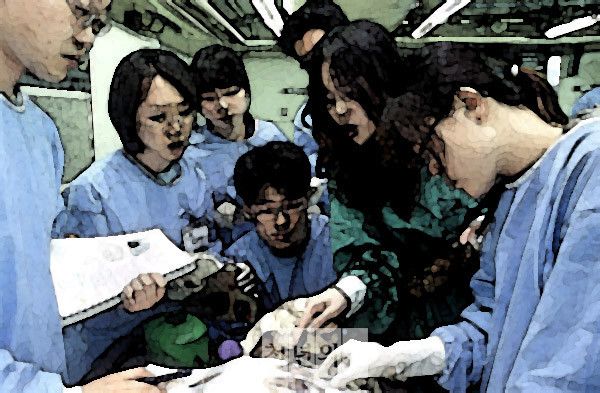To address the shortage of cadavers for anatomy, the ruling People Power Party (PPP) has proposed a bill to allow the moving of corpses among medical schools for educational purposes.

The bill also calls for expanding the qualification of professors who can teach cadaver dissection from anatomy, pathology, and forensic medicine specialists to professors in charge. This means doctors who have not majored in related fields can teach cadaveric dissection.
Rep. Han Ji-ah, a PPP lawmaker and member of the National Assembly's Health and Welfare Committee, introduced a bill to amend the Act on the Dissection and Preservation of Human Corpses (Cadaver Dissection Act) to this effect on Tuesday.
The amendment aims to mandate prior screening for the use of cadavers, including observing dissections, punish those who use or arrange for the use of cadavers for commercial purposes while establishing a government monitoring system, and allow the transfer of cadavers to other medical schools for medical student education if the donor and bereaved family agree.
The amendment revised “body parts” to “bodies, etc.” to allow the transfer of bodies for medical educational purposes. However, the donor and surviving family members must agree. The amendment was made in response to criticism that there is a large disparity in the number of cadavers held by medical schools. According to the Ministry of Education, one medical college has 453 cadavers while another has only seven, indicating a difference of about 65 times.
The bill has also expanded the scope of teachers who can dissect cadavers.
Currently, professors (including associate and assistant professors) who have majored in medical anatomy, pathology, and forensic medicine can teach anatomy to medical students. However, the amendment allows professors who did not major in these specialties to teach cadaver dissection. Pathology and forensic medicine can only be majored by doctors, but anatomy can be majored by non-doctors.
In addition, the heads of medical schools and general hospitals are required to establish a cadaver dissection review committee to use cadavers for medical education or medical and biomedical research. A Ministry of Health and Welfare decree will determine the committee's composition and operation.
Human anatomical research must undergo the review of the cadaver dissection review committee. The Institutional Review Board (IRB) must review research using human body parts.
Cadavers for human anatomical research will be restricted to medical schools to educate medical students. Violators are subject to suspension of the provision of cadavers, imprisonment for up to one year, or a fine of up to 10 million won ($7,158). Currently, there is no regulation or management system for the use of cadavers. In June, a paid training program for non-medical personnel to observe anatomy became controversial.
Medical schools and general hospitals that collect and preserve cadavers are required to regularly submit data on the collection and use of cadavers to the Minister of Health and Welfare, as stipulated by the ministry’s decree.
Rep. Han expected the bill to improve and complement deficiencies in the current system by prohibiting the use of donated bodies for profit or other purposes, including observing dissections, and better the educational environment by reducing the gap in body donations among medical schools.
“In the last five years, there have been 26 cases of cadaver dissection training for non-medical personnel,” Han said. “Even though donated cadavers should be used for medical care and research for medical students, doctors, and other medical majors, cadaver dissection training has been provided to non-medical personnel for profit.”
She continued, “It should never happen again that bodies are used against the noble wishes of donors and bereaved families. I hope the amendment will improve the medical education environment in Korea by systematically managing bodies for medical and research purposes.”
Related articles
- 'Why do they hate us?’: Parents, students rally against government's medical student quota expansion
- Assembly to tighten rules to ban commercial use of cadavers
- ‘Government tries to turn medical schools into quack training centers’
- 'Over 8,000 med students should take classes together, instead of current 3,000'

